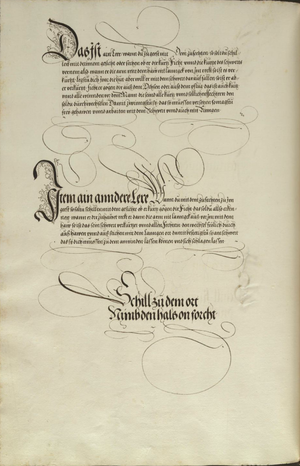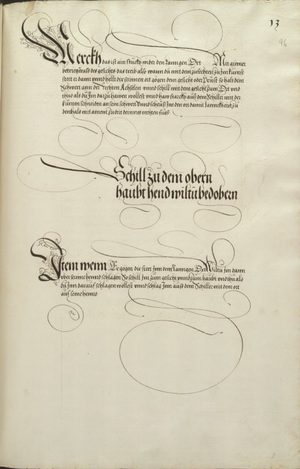|
|
You are not currently logged in. Are you accessing the unsecure (http) portal? Click here to switch to the secure portal. |
User:Kendra Brown/Latin Lew/88v
Munich 88v / PDF page 22
Contents
Missing Zettel verses from Dresden 95v (28)
German
- Schill zu dem ort
- Nimb den hals on forcht
English (Fritz)
- Schiel to the point,
- take the neck without danger.
88v a
88v a Latin
USUS STRABONIS, ALIUS contra mucronem longiorem.
EUM habitum hoc modo exerceas, Si ad hostem prope concesseris, et is contra visum tuum vel pectus porrigat ensem, tu dextro humero ensem adiunctum contineas, versumque mucronem oculos limes convertas, post simulato, quasi eo ferire voles, Verum fortiter ex eo ictu qui nobis strabo dicitur praemissa acie brevi, gladium eius ferias, inde vero mucronem longiorem versus hostis collum addito progressu dextri pedis propellito.
88v a English
USE OF THE SQUINTER ANOTHER against the longer point
Practice this gesture in this way, If you step close to the enemy, and he extends the sword against your face or breast, YOU hold the sword in position next to your right upper arm, and you invert turning back the sword in the side eye, afterwards pretend, as if you wanted to strike [using it (side eye)?], Truly strongly out of [the same] the strike which is called squinter by us having been sent forward using the long edge, strike his sword, thence truly adding the long point toward the opponent's neck, drive forward with an advance of the right foot.
88v a Latin (Sandbox)
- USUS STRABONIS,
- ALIUS contra mucronem longiorem.
- EUM habitum hoc modo exerceas,
- Si ad hostem prope concesseris[^1],
- et is contra visum tuum vel pectus porrigat ensem,
- tu dextro humero ensem adiunctum contineas,
- versumque mucronem oculos limes convertas,
- post simulato,
- quasi eo ferire voles,
- Verum fortiter ex eo ictu qui nobis strabo dicitur praemissa acie brevi,
- gladium eius ferias,
- inde vero mucronem longiorem versus hostis collum addito progressu dextri pedis propellito.
88v a English (Sandbox)
- USE OF THE SQUINTER
- ANOTHER against the longer point
- practice this gesture in this way,
- If you step close to the enemy,
- and he extends the sword against your face or breast,
- YOU hold the sword in position next to your right upper arm,
- and you invert turning back the sword in the side eye,
- afterwards pretend,
- as if you wanted to strike [using it (side eye)?],
- Truly strongly out of [the same] the strike which is called squinter by us having been sent forward using the long edge,
- strike his sword,
- thence truly adding the long point against the opponent's neck drive forward with an advance of[^2] the right foot.
88v a notes
[^1]: step, from concedo driangle or something similar [^2]: progressu-- i might have wishfully mangled this grammar
parallel construction, two targets, present in german
Missing Zettel verses from Dresden 96r (29)
German
- Schill zu dem obern
- haubt hend wiltu bedobern
English (Fritz)
- Schiel/squint to the upper
- if you want to spoil head and hands.
88v b
88v b Latin
HABITUS, QUO MANUS adversarij feriuntur.
SI adversarius contra te consistat in habitu longioris mucronis, et tu ferire eius manus cupias, tum quasi Strabone faciem vel caput concutere velis, simulato verum mutato animi proposito manus inde saucies.
88v b English
A GESTURE, IN WHICH THE HAND of the enemy is struck
IF the enemy stands against you in the method of the long sword, and YOU desire to hit his hand, then you want to strike together the face or the head as if with a squinter, truly feint, by changing the purpose of the mind, thence you strike the hand.
88v b Latin (Sandbox)
- HABITUS, QUO MANUS
- adversarij feriuntur.
- SI adversarius contra te consistat in habitu longioris mucronis,
- et tu ferire eius manus cupias,
- tum quasi Strabone faciem vel caput concutere velis,
- simulato verum mutato animi proposito manus inde saucies.
88v b English (Sandbox)
- A GESTURE, IN WHICH THE HAND
- of the enemy is struck
- IF the enemy stands against you in the method of the long sword,
- and YOU desire to hit his hand,
- then you want to strike together the face or the head as if with a squinter,
- truly feint, by shifting the purpose of the mind, thence you strike the hand.
88v b notes
two targets (face or head), German uses inclusive (face and head) and to strike at both


